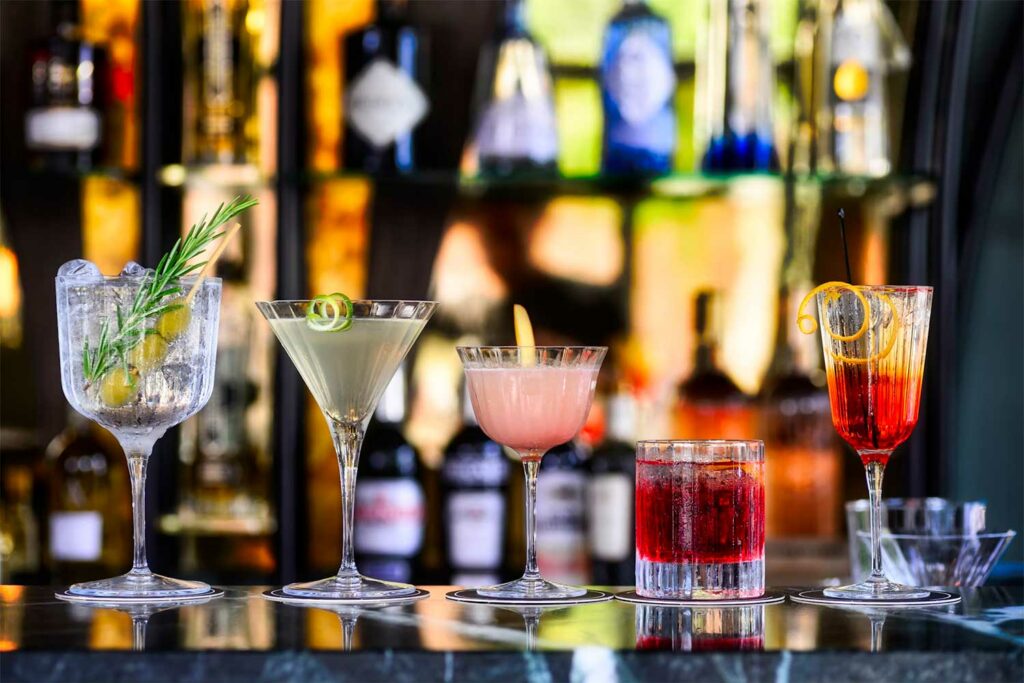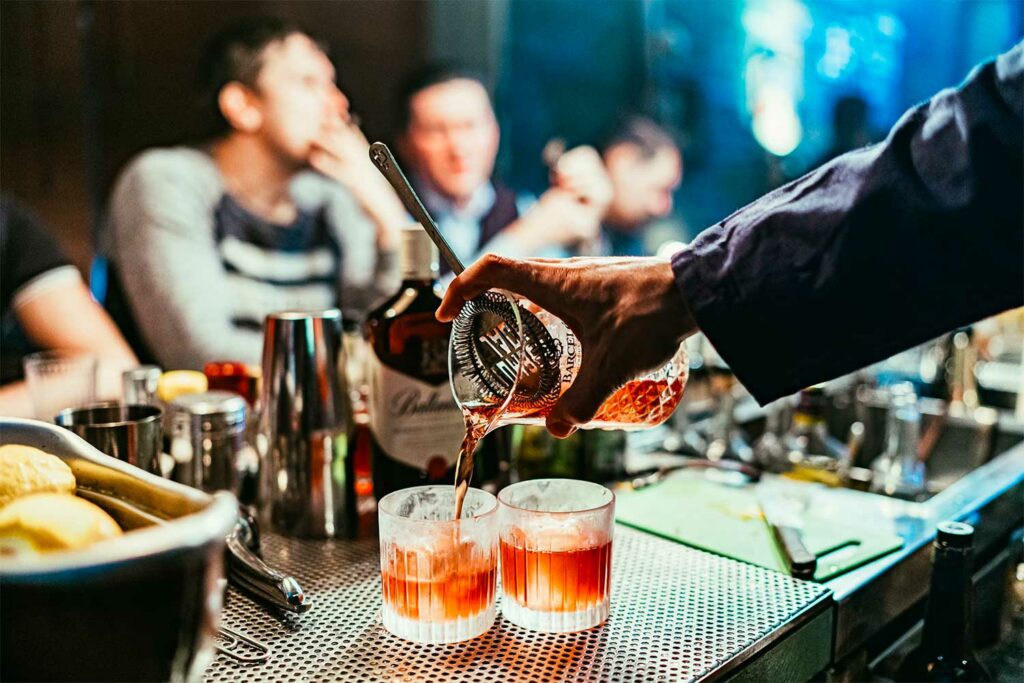Master cocktail creation in Lyon. A 2-hour mixology class to make four drinks with professional barkeepers in a cozy bar setting.
Nestled in Lyon’s energetic neighborhoods, a cocktail workshop in Lyon invites both amateurs and curious travelers to step behind the bar and explore the refined art of mixology education. In a cozy bar atmosphere in either the 2ᵉ or 7ᵉ arrondissement, participants learn hands-on how to blend flavors, balance spirits, and elevate drink presentation—all under the mentorship of professional barmen. Over two hours, you will be guided to craft four different cocktails, learning essential techniques, ingredient selection, and the theory behind flavor combinations. The ambiance is friendly yet focused, allowing space for experimentation while benefiting from expert instruction. This is not just an experience for tourists, but a genuine mini-academy of cocktail craft—one that equips you with skills to impress at home, deepen your understanding of spirits, or simply enjoy a refined evening of creative sipping.
Overview at a Glance
- City: Lyon
- Region: Auvergne-Rhône-Alpes
- Price: €75 TTC
- Duration of the course: 2 hours
- Conditions / restrictions: up to 16 participants, minimum age 18, basic materials supplied, beginner to intermediate level
- Provider(s): Le Grisbi – Atelier Cocktail Lyon
About the course and its context
The cocktail workshop Lyon emerges within Lyon’s vibrant bar and gastronomy scene, where mixology has become a compelling complement to wine and food discovery. While many Lyon bars now host thematic tasting evenings, this workshop is framed as a structured educational experience rather than a casual bar visit. Providers such as Le Grisbi regularly host atelier cocktails to help participants grasp the logic of ingredients, drink balance, glassware and presentation. Le Grisbi, located on Rue Mercière, offers mixology sessions of 1h30 with guidance from their team, in an accessible, urban setting.
In the context of experiential tourism and culinary travel, cocktail classes complement food tours and wine tastings. They attract locals, visitors, groups looking for creative evenings, and aficionados seeking hands-on technique rather than simply passive consumption. As Lyon increasingly positions itself as a gastronomic capital, combining cocktail craftsmanship with gourmet experiences raises the city’s appeal. This workshop fits that trend: it’s not a superficial demo, but a mini educational lab in cocktail science, flavor theory, and bar technique—all condensed into a modest timeframe.


The bartender / expert: career, expertise and teaching style
The instructors leading this cocktail workshop are seasoned barmen / mixologists who combine bar practice, sensory insight, and a pedagogical approach. While the specific names aren’t always published, providers emphasize that participants will learn “auprès de barmen professionnels passionnés” (with passionate professional bartenders). The tone is supportive, the teaching adaptive, and the pace calibrated for both novices and those with modest experience.
In many Lyon ateliers, the instructor begins by explaining the cocktail families, the role of base spirits (gin, vodka, rum, tequila), flavor modifiers (liqueurs, syrups, bitters), and technical tools (shaker, strainer, jigger). They often illustrate by preparing a demo drink, narrating balance principles, then invite participants to replicate under supervision. The instructor circulates, giving individual pointers, adjusting ratios, and encouraging tasting feedback. Many will share anecdotes about bar culture, spirit trends, and ingredient sourcing to enrich connection beyond technique.
A good mixology instructor blends technical precision with approachability. They demystify measurements, aroma profiling, and glassware logic. They encourage tasting reflection (“Does this feel zesty, sweet, bitter?”) and iteration (“Try adjusting the syrup, see how it shifts”). Participants are invited to experiment, make mistakes, and refine. The result is that you leave not just with four cocktails, but with a foundation in cocktail reasoning, confidence to adapt recipes, and curiosity to explore further.
The structure of the course
At the start, the workshop opens with a short introduction: you’ll meet your instructor, view the bar space, and receive a briefing on cocktail philosophy—how drinks are structured into base spirits, supporting flavors, sweeteners, bitters, and garnish. The instructor explains essential bar tools (shaker, strainer, jigger, muddler) and ingredient categories (spirits, liqueurs, fresh juices, syrups).
You then proceed to craft four cocktails in sequence. Usually the first is a guided pour-along with the group, replicating a classic recipe, while the instructor demonstrates technique and highlights balance, dilution, shaking vs stirring. The second and third drinks allow more freedom: you may experiment with gin, rum, vodka, or tequila as base, mixing with modifiers, adjusting quantities, and deciding garnish and glassware. The instructor supervises each step, stepping in to correct if proportions or technique stray. The final cocktail is often framed as a creative twist or surprise theme, pushing participants to improvise or incorporate an unexpected ingredient.
With each cocktail, you taste, compare, and discuss what you perceive—acidity, sweetness, texture, finish. The instructor prompts reflection: what changed when we added more citrus? Why this garnish accentuates aroma? This feedback loop deepens your palate awareness. The use of tapas or palate cleansers may accompany tasting to neutralize flavors and reset between cocktails. Though the advertised core is 2 hours, variations may stretch to 2h30 depending on number of participants (see Funbooker’s listing).
What this structure offers beyond mere cocktail recipes is sensory calibration, an understanding of flavor interplay, tool handling, and creative confidence. Participants walk away not simply having mixed drinks, but having been guided through the logic behind each choice: base spirit, modifiers, balancing, dilution, presentation. That knowledge becomes portable: you can adapt, invent, and critique cocktails beyond the workshop.
Why join this cocktail class in Lyon
Joining this cocktail workshop in Lyon is much more than a fun evening — it’s an investment in skill, sensory growth, and creative confidence. First, you acquire real mixology knowledge, not just party tricks. By learning technique, flavor balance, and tool mastery, you elevate your cocktail making from imitation to informed craft.
Second, the experience fosters cultural enrichment. You engage with Lyon’s vibrant bar culture, explore trends in French mixology, and connect with the city’s gastronomic energy. It turns a casual night out into a meaningful, hands-on discovery of spirits and flavor composition.
Third, for hosts, enthusiasts, or professionals, this class provides tangible value. You can replicate or adapt your own recipes at home, surprise friends with elevated drinks, or enhance your credentials in hospitality, event planning or culinary circles. The vocabulary and confidence you gain allow you to speak knowledgeably about cocktails, judge drinks critically, and invent with structure.
Fourth, the small-group format (up to 16 participants) ensures personal attention, so it’s not generic but responsive to individual pace. The workshop bridges theory and practice, tasting feedback and experimentation. This is far more efficient than piecemeal self-learning: in two hours you compress months of trial and error into a guided, creative lab.
Lastly, the pleasure of making and sipping four cocktails in a classy, relaxed environment — with peers, conversation, and ambiance — is itself rewarding. This is tactile, sensory, sociable learning. Whether you come with friends, a partner, or solo, you leave not just with four prepared drinks, but with a foundation, an inspired mindset, and the tools to continue exploring mixology on your own. In Lyon’s cocktail and gastronomy scene, this workshop is a refined entry point and a gateway to deeper discovery.
Back to our wine tastings in France.